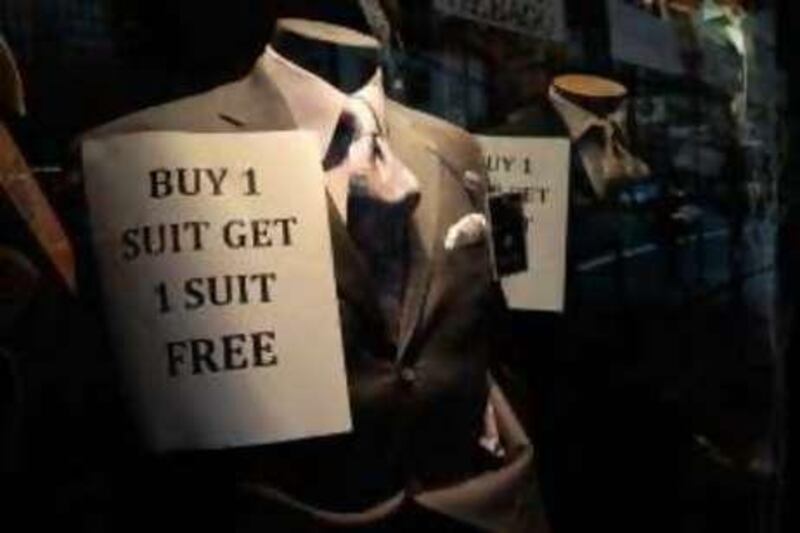Anybody who has been paying only the slightest bit of attention in the past six months will notice that things have got cheaper. But only now is it becoming clear just how much cheaper. There is a welter of offers encouraging you to spend, spend, spend. At the Bergdorf Goodman sale in New York, handbags are being marked down by 60 per cent. A fashion writer with her eye on the latest trend cattily remarked: "60 per cent is the new black." Nice line, but she is wrong. The new black is the BOGOF: buy one, get one free. We are used to this with new brands of toothpaste or washing powder. But cars and houses?
It was an Irish developer who came up with the first BOGOF property deal. When PJ Doherty Construction was struggling to sell its last five houses on its Lough Fern Heights development in Milford, County Donegal in Ireland, it offered to throw in a new apartment on the Black Sea Coast in Bulgaria. Bulgaria? Meanwhile, in Britain there is a website called Broadspeed. You can sign up for an e-mail alert that will allow you to buy a new car and they will throw in another free. The latest offer was for a Kia Magentis two-litre saloon. For £15,220 (Dh86,644) you could have two of these delivered to your door. The trouble is, nobody in their right minds would want to drive one of them, never mind two, nor have a holiday home in Bulgaria.
How far can this go? Personally, I would like to see this in the financial markets. Buy one pension, get one free. And while you are at it, if I buy Morgan Stanley, can I get Goldman Sachs too? And never mind just cars; what about car companies? I am sure that if one were to make a bid for General Motors, they would throw in Chrysler and possibly also Ford. But the problem is, nobody wants General Motors, or Chrysler, or Ford. The US government is going to have to snap them up, just as it did AIG, Goldman Sachs and Citibank.
On the other hand, I would like a Ferrari Scuderia Spider 16M, and I am sure my wife would like a Ferrari California. But when I made my generous offer to my pal, Luca di Montezemolo, the chairman of Ferrari, that I would be happy to buy one if he threw in another free, he just smiled enigmatically and said: "Non è possibile." I would also like a house in Mayfair, London and a villa in St Tropez. Curiously though, purveyors of these delights are not offering any BOGOF deals. And so we come to the harsh truth of the financial meltdown: what is valuable is what people want to buy.
The rest is rubbish. Nobody wants to drive a Kia. A brief trawl through the internet reveals other offers, such as two tickets for the price of one to see Elton John in concert. If people are having to give away villas in Bulgaria to sell properties in Ireland, the reality is that one should buy neither. Do not touch the BOGOFs is my advice. Unless they are red, have a large throbbing engine and go from 0 to 60kmh quicker than you can say buyonegetonefree.
There are few bankers able to buy a Ferrari these days, so you have to wonder who the company will find to buy their beautiful cars. (They can't sell the entire production in the Middle East - or can they?) One of the earliest jokes going around on the internet on Sept 16 was the following: "What's the difference between a Lehman Brothers banker and a pigeon? Answer: a pigeon can still put a deposit on a Ferrari."
Just a year earlier, banks were falling over themselves trying to hire the most talented individuals. They offered them golden parachutes, handshakes and hellos. The bankers were as highly sought after as a Hermès Birkin bag, for which you had to put your name down on a list and wait a couple of years until Messrs Hermès deigned to deliver it to you. Nowadays, you can't give away a banker or a Birkin bag. Bankers who had to be fed regular bonuses are now forced to struggle along on US$250,000 (Dh918,259) a year.
Does that mean that is all they deserved in the first place? According to Dan Ariely, a behavioural economist, giving bonuses may affect employees in strange ways. As a test, he gave 87 participants a series of tasks that demanded attention, memory and creativity. A third were offered a small bonus if they worked well; another third a medium-sized bonus, and the final group a large bonus. The result? Well, the people offered medium bonuses performed no better or worse then those offered low bonuses. And those offered the highest bonuses? You might think they performed best. You would be wrong. "The group offered the biggest bonus did worse than the other two groups across all the tasks," he writes.
This confirms what I have long suspected, even before it became fashionable. Bankers were overpaid and over-pampered. Their sole attribute was that they were willing to get up early. But so, too, were milkmen, and nobody dreamed of giving them massive bonuses. Now the bankers have been cut down to size, it looks like paying them less lavishly will actually improve the performance of their banks, which is good news for shareholders. It is just that the parties won't be as good, car sales may stall and the handbag sellers will have to keep cutting their prices.
As for those of you with houses on the Black Sea coast, you would do well to find a friendly Bulgarian and hand over the keys. rwright@thenational.ae





